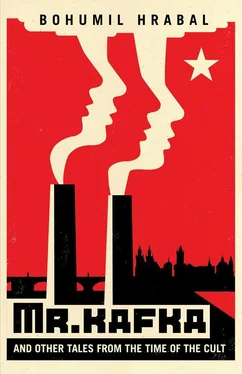“Stop! Stop!” cried Vindy.
The Judge pressed the button, but it was the wrong one. There was nothing he could do but press the right one.
“You’ll get the hang of it,” Vindy said. “But tell me about some of the other times when you were happy.”
“When I’d go to the small paint factory next door for firewood. They let me have old aniline-dye barrels — purple, red, green, blue, yellow — and I’d bring them back to our courtyard and chop them up. My hands got stained with whatever color had been in the barrel, and I’d touch my face and the back of my neck, and my daughter would laugh at me and say I looked like a parrot. Then we’d have a fire in the stove, and each time the flames were a different color.”
“Does the little yard engine that makes all that beautiful smoke go by here?” asked the film director,
“Every hour.”
“Damn! That would have made a great backdrop! But go and fetch some plates, and I’ll send for salami and rolls.”
The assistant director brought in some apprentice steelworkers and coached them for supporting roles in Lunch Break in our Factories . One group was supposed to look at the aquariums with interest and talk to each other about the fish, while the second group would emerge from the birch grove, run up to the workers in the middle of their discussion, and sing the popular motivational song, “We’ll Command the Wind to Blow and the Rain to Fall.”
The director took a piece of chalk and drew a diagram on the gate of the scrap-metal division. He and the assistant director choreographed the shooting plan. The gate slid open, while the apprentices stood around watching, and the director, chalk in hand, tapped the forehead of a man in an English-style suit walking through the gate into the sunlight, along with the factory manager in the black smock, and the shop steward in dirty coveralls.
“Right, we’re ready to go live,” the director said, and the grinders emerged from the factory hall with empty mugs and pails and picked up the salami and rolls in their free hands, and some opened their newspapers and sat leaning against the ingots while a group of apprentices bent over the aquariums looking at the fish, and the rest took up positions behind the little birch grove.
Vindy gave a signal and the hooks descended, clinking against the demijohn’s green glass.
“And now, a little something from me, Doctor,” he said, clearing his throat. “A poem to the great Jaroslav Vrchlický: No region lay beyond the reach of thy poetic soul on thy vasty pilgrimage through life. In verse, you made our history manifest, the obverse and reverse of all our eras, and thus, in winged words, you elevated and elated us, your brethren…”
As Vindy recited his piece, the senior worker arose from his plank in the little shack, kicked the door open, then sat down, looking through the window at the pickling vat shrouded in its cloud of greenish vapor. He cut his blood pudding into sections, counted them, carved himself an equal number of bread slices, then skewered a piece of blood pudding and a slice of bread with his knife, thinking how comical the Judge looked standing there, and wondering if he was confused about the buttons on the control pendant only because he, the senior worker, had been mean to him and whether it wouldn’t be better to try to get on the Judge’s good side because he was, after all, a judge, and the whole damn factory — all of Poldi Kladno — was full of people from professions and jobs and trades of all kinds, and the whole working-class character of the steelworks had gone down the drain, and the conversations you heard in the changing rooms were something else these days, a lot of eggheads had come in, and it was the same in the canteen, the guy in coveralls was really a colonel or maybe even an attorney general, and we had to be nice to them, because was it their fault that they ended up on the losing side?
“Action!” said the director, raising his arm, and the camera whirred; the grinders munched on their sandwiches, shouting at each other with their mouths full: “The fortress at Pusan is about to fall! Jump into the sea, you imperialists! We’re going to pour the molten steel of peace down your gullets!” The apprentices pointed at the fish, and the group emerging from the birches danced along the tracks, singing: “We’ll command the wind to blow and the rain…”
“Cut!” said the director. “And now we’ll do a medium shot from above.”
He helped the cameraman climb up on a wagon loaded with ingots, and the assistant carefully handed the camera up to him.
Again, the camera whirred, and the grinders rattled their empty dishes and shouted slogans, and the apprentices ran out of the birch grove and leaned over the aquarium again, until the director waved his arms and said, “Cut! That’s it — we’re done! Thank you!”
Vindy’s voice carried high over the acid vapors: “Greatest among poets, you sang the praises of our meadows and entered the pantheon of the Muses, Jaroslav, to join the company of giants. Today, your footsteps lead to glory everlasting… though not for everyone… for in these times, caught in the onrush of daily cares, we’ve spurned your legacy, oh master, or yet because the fleeting glory of this gilded age has blinded us. .. E’en so, with each new spring the orchards garb themselves in blossoms new, and our spirits do ascend once more from chaos unto order…”
Vindy removed his cap, revealing hair as thick as a lambskin hat and a head so large that the cap had to be slit at the back and refastened with a large safety pin. The senior worker emerged from the wooden shack, spat out a piece of blood pudding that had lodged between his rotting teeth, then stepped across the boards and walked past the hoppers and through the cloud of greenish vapor. When he emerged from the room where the demijohns of acid were stored, tongues of green vapor were licking at his coat and trousers like tiny flames.
Across the tracks came the manager, the shop steward, and the man in the English-style suit, who in the meantime had put on a worker’s cap.
“This is the Trade Union rep, in person,” said the manager.
“He made the time — tore up his busy schedule, in fact — to come to see you personally,” said the shop steward.
“Look here,” the union man said, “I’ve learned with great regret that you’re not on board with the notion that we must all work to bring socialism closer to fruition.” And because he saw in himself a reflection of the president and First Citizen, he tugged his cap further down over his forehead. ‘What would the author of Red Glow over Kladno say if he heard about this?”
“Good question,” said the Dairyman, raising his empty tankard. “What would Tonda Zapotocký say if he knew you’re having us meet quotas you haven’t negotiated with us according to regulations? Tonda was never against us! I was just a boy when he played the accordion with my dad, and in the evenings he taught the workers never to give in.”
The union rep turned around, took two steps, reached into to the aquarium, scooped up some water, and dabbled it on his forehead as though anointing himself with holy water. Then, in a fascinated tone, he said, “What kind of accordion was it?”
“A Helikon,” said the Dairyman, “and he’d go for a drink with my dad to Secka’s. Tonda was a mensch.”
The union rep took the map from the Priest’s fingers and studied it. “You can’t talk that way,” he said. “You’re playing into the hands of the aggressors. If I’m not mistaken, I heard you say during the shoot that you all understood quite correctly that Korea is bleeding and needs our weapons. But what am I hearing now?”
“Exactly the same thing as the shop steward here and the manager heard,” thundered the Dairyman, “You’re treating us like little boys, and that’s a dereliction of party morality! What the hell’s going on here?” the Dairyman shouted, pounding his tankard on an ingot.
Читать дальше












